
views
X
Research source
Finally, the Qur'an says, regarding the Friday prayer: O believers! When the call to prayer is made on Friday, then proceed diligently to the remembrance of Allah and leave off your business. That is best for you, if only you knew.
Preparing for the Khutbah

Choose a good topic. Avoid controversial topics that are likely going to cause divisions within the congregation. As the Jumu'ah prayer is a time for coming together, you should choose a topic that will unite the congregation. Also avoid complicated topics, such as the nitty-gritty rules of inheritance, as not everyone will be able to understand the topic properly. Remember, the congregation should be able to leave the mosque with a lesson learnt, and if you choose a very niche topic, the khutbah might not be as effective. Try to choose a relevant topic. For example, if Ramadan, Eid or the Hajj season is approaching in a few weeks, speak about the virtues of these events so that the congregation can understand their significance.

Learn and practice public speaking. The khutbah is an act of public speaking in front of a large audience. On Fridays, the mosques are normally packed even more, so it's vital that you know how to deliver an effective khutbah in order to benefit the congregation. With that in mind, you need to know that these people have a respect for knowledge, so you should be able smoothly and coherently deliver the sermon. There are many ways to do this, for example: Look at the audience. When they feel that you are speaking directly to them, they will feel engaged. Raise your voice to emphasise certain points. This will bring back any attention that may have been lost and emphasise the key parts of your speech. Know your verses and hadiths. The worst thing to do when delivering a khutbah is being unable to recite a certain verse, mispronouncing the verse, or forgetting a verse. Come prepared beforehand; revise the verses or narrations you are going to say. This is also especially important because you don't want to constantly be looking at your script. Learn as much of the English as you can by heart, and definitely memorize the Arabic. Remember: if you misread a verse, you may change the meaning, so be careful, and don't be afraid to have a quick glance at your notes to remind you of the words. Going over the English is just as important as going over the Arabic; if English isn't your mother-tongue, it may be best to avoid words that you may have difficulty pronouncing. Some people might get distracted, and even find it funny, if you mispronounce a word.
Delivering the Khutbah
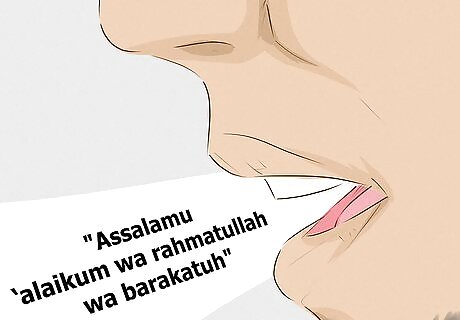
Go up to the pulpit and greet the congregation. You are expected to use the full Islamic greeting, "Assalamu ‘alaikum wa rahmatullah wa barakatuh" (May the peace, mercy, and blessings of Allah be with you). After saying this, sit down. After the khateeb (person doing the sermon) sits down, the muaddhin (person who does the call to prayer) will do the adhan.

Stand up and recite the Khutbat-ul-Haajjah. The Prophet (peace be upon him) used to praise Allah before starting his khutbah. The Khutbat-ul-Haajjah is read in Arabic and is: Al-hamdu Lillaahi nahmaduhu wa nasta’eenahu wa nastaghfiruhu, wa na’oodhu billaahi min shuroori anfusinaa wa min sayi’aati a’maalinaa. Man yahdih Illaahu falaa mudilla lahu wa man yudlil falaa haadiya lahu. Wa ashhadu an laa ilaaha ill-Allaah wahdahu la sharika lahu wa ashhadu anna Muhammadan ‘abduhu wa rasooluhu. إِنَّ الْحَمْدَ لِلَّهِ ,نَحْمَدُهُ وَنَسْتَعِينُهُ ونستغفره ,ونعوذ بالله من شرور أنفسنا ,ومن سيئات أعمالنا ,مَنْ يَهْدِهِ اللَّهُ فَلَا مُضِلَّ لَهُ ,وَمَنْ يُضْلِلْ فَلَا هَادِيَ لَهُ ,وَأَشْهَدُ أَنْ لَا إِلَهَ إِلَّا اللَّهُ وَحْدَهُ لَا شَرِيكَ لَهُ ,وَأَنَّ مُحَمَّدًا عَبْدُهُ وَرَسُولُهُ Praise be to Allaah, we seek His help and His forgiveness. We seek refuge with Allaah from the evil of our own souls and from our bad deeds. Whomsoever Allaah guides will never be led astray, and whomsoever Allaah leaves astray, no one can guide. I bear witness that there is no god but Allaah, the One, having no partner. And I bear witness that Muhammad is His slave and Messenger.
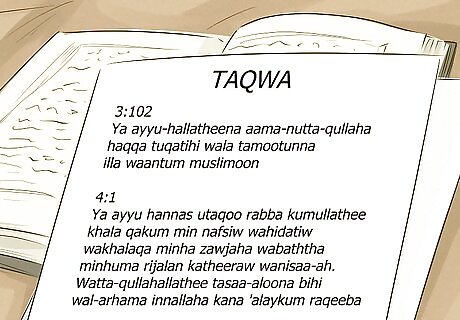
Recite verses of taqwa (piety). You can recite any verse that will call people to be God-fearing and pious. The verses commonly read are 3:102, 4:1, and 33:70-71. Ya ayyu-hallatheena aama-nutta-qullaha haqqa tuqatihi wala tamootunna illa waantum muslimoon (You who believe, be mindful of God, as is His due, and make sure you devote yourselves to Him, to your dying moment. ) يَـٰٓأَيُّهَا ٱلَّذِينَ ءَامَنُوا۟ ٱتَّقُوا۟ ٱللَّـهَ حَقَّ تُقَاتِهِۦ وَلَا تَمُوتُنَّ إِلَّا وَأَنتُم مُّسْلِمُونَ Ya ayyu hannas utaqoo rabba kumullathee khala qakum min nafsiw wahidatiw wakhalaqa minha zawjaha wabaththa minhuma rijalan katheeraw wanisaa-ah. Watta-qullahallathee tasaa-aloona bihi wal-arhama innallaha kana 'alaykum raqeeba (People, be mindful of your Lord, who created you from a single soul, and from it created its mate, and from the pair of them spread countless men and women far and wide; be mindful of God, in whose name you make requests of one another. Beware of severing the ties of kinship: God is always watching over you.) يَـٰٓأَيُّهَا ٱلنَّاسُ ٱتَّقُوا۟ رَبَّكُمُ ٱلَّذِى خَلَقَكُم مِّن نَّفْسٍ وَٰحِدَةٍ وَخَلَقَ مِنْهَا زَوْجَهَا وَبَثَّ مِنْهُمَا رِجَالًا كَثِيرًا وَنِسَآءً ۚ وَٱتَّقُوا۟ ٱللَّـهَ ٱلَّذِى تَسَآءَلُونَ بِهِۦ وَٱلْأَرْحَامَ ۚ إِنَّ ٱللَّـهَ كَانَ عَلَيْكُمْ رَقِيبًا Ya ayyu-hallatheena aama-nuttaqullaha wa qooloo qawlan sadeeda. Yuslih lakum a'maalakum wayaghfir lakum thunoobakum. Wamay yuti'illaha wa rasoolahu faqad faaza fawzan 'atheema (Believers, be mindful of God, speak in a direct fashion and to good purpose, and He will put your deeds right for you and forgive you your sins. Whoever obeys God and His Messenger will truly achieve a great triumph. ) يَـٰٓأَيُّهَا ٱلَّذِينَ ءَامَنُوا۟ ٱتَّقُوا۟ ٱللَّـهَ وَقُولُوا۟ قَوْلًا سَدِيدًا. يُصْلِحْ لَكُمْ أَعْمَـٰلَكُمْ وَيَغْفِرْ لَكُمْ ذُنُوبَكُمْ ۗ وَمَن يُطِعِ ٱللَّـهَ وَرَسُولَهُۥ فَقَدْ فَازَ فَوْزًا عَظِيمًا
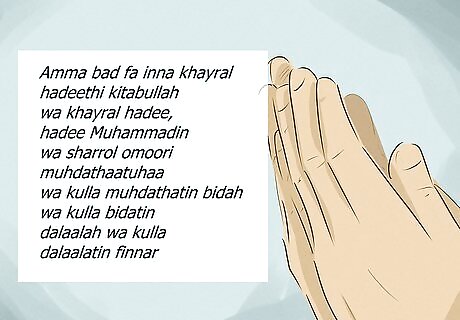
Recite another du'a. While there are many supplications to read, a common one that is read is usually about bid'ah (innovation in religious matters). This is as narrated in Sahih Bukhari. Amma ba'd (أما بعد). May yah di hillahu falaa mudhila lahoo, wa may yudhlil hu falaa haadiya lahoo. Ina asdaqal hadeethi kitaabullah, wa ahsanal hadyi hadyu muhammadin, wa sharal umoori muhda-thaa-tu-haa, wa kulla muhda-tha-tim bid'ah, wa kula bid'a-tin dhalaalah, wa kulla dhalaala-tin fin-naar. مَنْ يَهْدِهِ اللَّهُ فَلاَ مُضِلَّ لَهُ وَمَنْ يُضْلِلْهُ فَلاَ هَادِيَ لَهُ إِنَّ أَصْدَقَ الْحَدِيثِ كِتَابُ اللَّهِ وَأَحْسَنَ الْهَدْىِ هَدْىُ مُحَمَّدٍ وَشَرَّ الأُمُورِ مُحْدَثَاتُهَا وَكُلَّ مُحْدَثَةٍ بِدْعَةٌ وَكُلَّ بِدْعَةٍ ضَلاَلَةٌ وَكُلَّ ضَلاَلَةٍ فِي النَّارِ "Whomsoever Allah guides, none can lead him astray, and whomsoever Allah sends astray, none can guide. The truest of word is the Book of Allah and best of guidance is the guidance of Muhammad. The worst of things are those that are newly invented; every newly-invented thing is an innovation and every innovation is going astray, and every going astray is in the Fire."
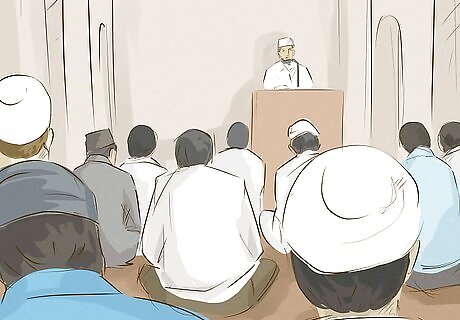
Start your khutbah. It can be on any topic, such as a particular verse or hadith, Islamic events, or recent societal issues. Once you finish the first part of the sermon, recite Aqoolu qawli haa dhaa wa'asstagh fi rullaha lee wa lakum, which means "I say these words of mine and I ask Allah for forgiveness". أقول قولي هذا وأستغفر الله ولكم This part of the khutbah is not mandatory. If your time is limited, you should only recite the mandatory Arabic parts of the khutbah, as the English speech is additional.

Sit down for a moment or two. This is part of the sunnah. This time should be used for forgiveness, which is why you recite a short du'a before sitting down, to inform the congregation to repent during this time. If your throat is sore or dry from all the speaking, feel free to keep a bottle of water next to you and have a quick sip—just don't leave the pulpit.

Stand up again and praise Allah. Just as you did at the beginning of the first part, you need to praise Allah and His Messenger at the beginning of the second part. Recite Alhamdulillah was Salatu Wassalamu ‘ala Rasulullah, which means "My thanks and gratitude belong to Allah the Lord of all mankind, I ask Allah to bless and bestow peace on Prophet Muhammad". Continue with your sermon. الْحَمْدُ لِلَّهِ والصلاة والسلام على رسول الله Instead of starting a new topic, take this time (the second part is shorter than the first part, and shouldn't be longer than about 5-10 minutes) to recap upon what you already said. Focus on the future and advise the congregation about how they can implement what was said into their lives. Emphasise the key points of the sermon that you would like them to leave the mosque having remembered.
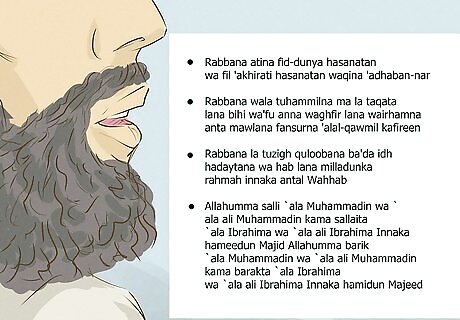
End the sermon with du'as and salawat. Send blessings upon the Prophet and make du'a for the congregation and for Muslims around the world. Some du'as you can say are: Rabbana atina fid-dunya hasanatan wa fil 'akhirati hasanatan waqina 'adhaban-nar, meaning "Our Lord, give us good in this world and in the Hereafter, and protect us from the torment of the Fire" رَبَّنَآ ءَاتِنَا فِى ٱلدُّنْيَا حَسَنَةً وَفِى ٱلْـَٔاخِرَةِ حَسَنَةً وَقِنَا عَذَابَ ٱلنَّارِ Rabbana wala tuhammilna ma la taqata lana bihi wa'fu anna waghfir lana wairhamna anta mawlana fansurna 'alal-qawmil kafireen, meaning "Lord, do not take us to task if we forget or make mistakes. Lord, do not burden us as You burdened those before us. Lord, do not burden us with more than we have strength to bear. Pardon us, forgive us, and have mercy on us. You are our Protector, so help us against the disbelievers" رَبَّنَا لَا تُؤَاخِذْنَآ إِن نَّسِينَآ أَوْ أَخْطَأْنَا ۚ رَبَّنَا وَلَا تَحْمِلْ عَلَيْنَآ إِصْرًا كَمَا حَمَلْتَهُۥ عَلَى ٱلَّذِينَ مِن قَبْلِنَا ۚ رَبَّنَا وَلَا تُحَمِّلْنَا مَا لَا طَاقَةَ لَنَا بِهِۦ ۖ وَٱعْفُ عَنَّا وَٱغْفِرْ لَنَا وَٱرْحَمْنَآ ۚ أَنتَ مَوْلَىٰنَا فَٱنصُرْنَا عَلَى ٱلْقَوْمِ ٱلْكَـٰفِرِينَ Rabbana la tuzigh quloobana ba'da idh hadaytana wa hab lana milladunka rahmah innaka antal Wahhab, meaning "Our Lord, do not let our hearts deviate after You have guided us. Grant us Your mercy: You are the Ever Giving". رَبَّنَا لَا تُزِغْ قُلُوبَنَا بَعْدَ إِذْ هَدَيْتَنَا وَهَبْ لَنَا مِن لَّدُنكَ رَحْمَةً ۚ إِنَّكَ أَنتَ ٱلْوَهَّابُ Alahumma salli 'ala Muhammad wa 'ala ali Muhammad, kama sallaita 'ala Ibrahima wa barik 'ala Muhammad kama barakta 'ala ali Ibrahim fil-'alamin, innaka hamidun majid, meaning "O Allah, send blessings upon Muhammad and upon the family of Muhammad, as You sent blessings upon the family of Ibrahim, and send blessings upon Muhammad and upon the family of Muhammad as You sent blessings upon the family of Ibrahim among the nations. You are indeed Worthy of praise, Full of glory." اللَّهُمَّ صَلِّ عَلَى مُحَمَّدٍ وَآلِ مُحَمَّدٍ كَمَا صَلَّيْتَ عَلَى آلِ إِبْرَاهِيمَ إِنَّكَ حَمِيدٌ مَجِيدٌ اللَّهُمَّ بَارِكْ عَلَى مُحَمَّدٍ وَآلِ مُحَمَّدٍ كَمَا بَارَكْتَ عَلَى آلِ إِبْرَاهِيمَ إِنَّكَ حَمِيدٌ مَجِيدٌ

Announce the prayer. At the end of the du'as, simply say wa aqimas salah (establish the prayer أَقِيمُوالصَّلاَةِ). The congregation will then stand up and stand for prayer. As many people turn up for the Friday prayer, mosques are usually packed with worshippers. Ensure that everyone is fitted in and standing properly. Before starting, you can say the following Arabic phrases to remind the congregation:: Istawoo (اسْتَوُوا): straighten your rows Taraasoo (تراصوا): stand close together Sawwoo sufoofakum ( سَوُّوا صُفُوفَكُمْ): straighten your rows Aqeemoo sufoofakum (أقيموا صفوفكم): make your rows straight "Saddul khalal (سُدُّوا الْخَلَلَ): fill in the gaps Haathoo bil manaakib (حَاذُوا بِالْمَنَاكِبِ): align your shoulders I'tadiloo (اعْتَدِلُوا): keep straight The above can be read in English if you wish, as long as the congregation understands. For example, you can say "Make sure there are no gaps. Stand straight, shoulder to shoulder.". You don't need to say all of this. It's common to say "Istawoo, taraasoo, i'tadiloo" (Straighten your rows, stand close, keep straight).




















Comments
0 comment